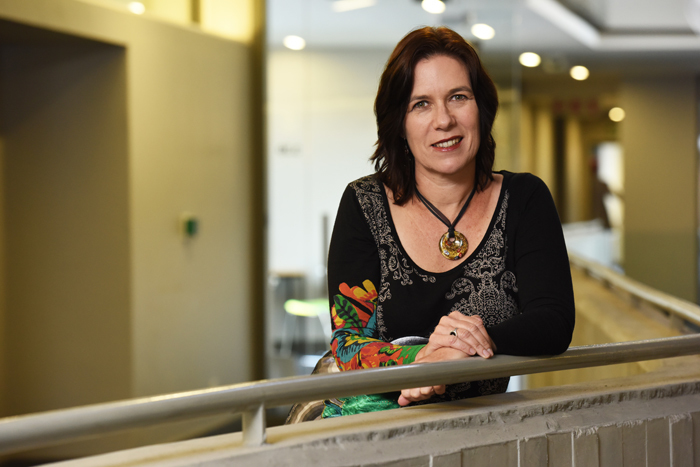Higher education must change students' agency in the world
13 June 2016 | Story Helen Swingler. Photos Michael Hammond.
“Higher education must change the person and it must change their capacity to act in the world, what they can do and how they do it,” says Case, who is based at UCT's Centre for Research in Engineering and Science Education. Her 2014 book, Researching Student Learning in Higher Education: A social realist approach, has won UCT's Meritorious Book Award for 2015.
Change and agency are at the heart of the work, which leaps beyond conventional educational theory. The book tackles crucial aspects of students' access and success in higher education; no longer a simple in-out model but linked to the social and political context. It asks questions about the role that higher education should play in post-apartheid South Africa.
Case says, “This book turns this conversation on its head by inserting a full consideration of student agency into the context of higher education. Working sociologically, it explores the influence of the social context on what the individual student achieves.”
Published by Routledge, the book is based on a longitudinal study Case started in the early 2000s when she spent a year in class with third-year chemical engineering students at UCT. The text is driven by the narratives of 14 students, and particularly one student's experiences (she calls him Sizwe).
In that time she got really close to the group and her interviews gave her a real sense of their alienation in the higher education system – and how it sometimes fails them.
“Third-year engineering is really tough,” says Case. “The students are already dealing with their own evolution as 20-year-olds, living with the multiple legacies of apartheid, dislocated from their home backgrounds and trying to cope with one of the university's toughest courses − with frighteningly little margin for error.
“There's an assumption that if we 'fix' the first-year transition, everything will be okay.”
Life after university
Case interviewed the students again eight years after graduation.
“The take-home message was about the traction they had as young people in the world. They were all working, nearly all in engineering, mostly in South Africa. And they were all really making a difference in the world. They had a strong sense of themselves and their role as engineers.”
When Case asked them to think back to their undergraduate experience, she was struck by how it had shaped them. (In the book she shares proposals to improve student learning in higher education.)
“They said very explicitly: 'I was formed by that process and the difficulty of it made me who I am.' There was a sense of, 'Hey, I can survive anything if I survived that degree.' They had become people who felt they could solve difficult problems, handle the undefined sets of complex things being thrown at them. They had become independent thinkers and team players. And that's what you want from engineers.”
In the book, Case developed a novel set of proposals for improving student learning. Many have already been implemented in the chemical engineering curriculum at UCT; there's more breadth to the degree, for example.
“The 2015 and 2016 third-years do have a slightly different experience on campus, bearing in mind that engineering will always be intense. But I do see more students being more involved in the broader university life; they do take more elective courses and we do require them to.”
Broader audience
When she wrote the book, she envisaged an engineering audience, but the canny publisher saw it differently and challenged her to write something “with more general relevance” to higher education.
Writing a book was a challenge in itself.
“But I enjoy narrative, so I was able to use narrative to drive the book in a particular way.”
She penned the work in 2013 when there was already a gathering urgency of questions around higher education: Who benefits? Who are universities for? Do they meet students' aspirations? But the turning point was securing a UCT-Harvard Mandela Fellowship, an “amazing opportunity” for UCT staff that was established through generous support from the Mellon Foundation. As a result, she spent five months at Harvard's Du Bois Institute and in that time produced her first draft of the book.
“It was a very generative space for me. Writing a book really forces you to put your ideas together at a different level.”
Working with colleagues from Rhodes and the University of the Western Cape, Case has started a second book, a study of BA and BSc students across three South African institutions.
 This work is licensed under a Creative Commons Attribution-NoDerivatives 4.0 International License.
This work is licensed under a Creative Commons Attribution-NoDerivatives 4.0 International License.
Please view the republishing articles page for more information.










